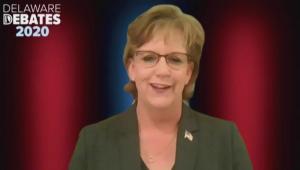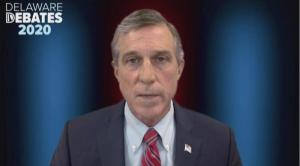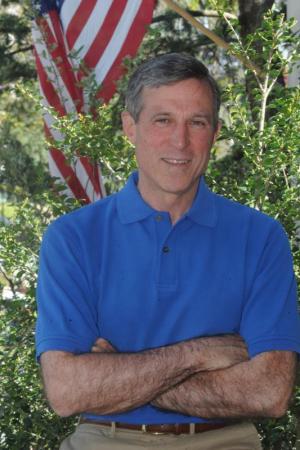Governor candidates present differing approaches to COVID-19
Delaware's gubernatorial candidates squared off Oct. 13, presenting contrasting plans for handling COVID-19 cases and the state's economy during a virtual debate hosted by the University of Delaware and Delaware Public Media.
“We'll continue to follow the science and wear masks. It's a small sacrifice to protect our neighbors. This is not a partisan political issue. It's a public health crisis,” said Gov. John Carney, who is running for a second term in office. “[We'll] stay focused on a healthy community and a strong economy. You can't be either/or; we have to have both.”
His opponent, Republican Julianne Murray, said residents she has spoken with while campaigning across the state have expressed frustration with business restrictions still in place since the beginning of the COVID-19 outbreak, and the state's continued mask requirements. Murray said more information is needed on the acuity of the disease and who is really at risk instead of a general fearmongering throughout the greater population.
“Mask wearing should be voluntary,” she said. “Who we need to be concerned about here is our vulnerable population, and our vulnerable population is people with pre-existing conditions and the elderly.”
Murray said an outbreak in Sussex County poultry plants should have been anticipated because of close working conditions at those locations, and education is key to preventing the spread of COVID-19 among Hispanic populations in Sussex County. She said while there were positive test results surrounding the poultry plants, there were no deaths.
Carney, however, said he did anticipate the outbreak in the poultry plants after the first positive case was announced in Milford, and that a 44-year-old Hispanic man in Georgetown did die from COVID-19. Hospitals later reported acuity among poultry workers, he said, but overall in the Haitian/Creole and Hispanic communities, there was not a great number of fatalities.
Carney said state officials were set back about a week after the White House issued an order preventing the shutdown of meat processing plants, but health officials were able to test thousands of poultry workers, family members and neighbors. “I would believe our response to the outbreak in the poultry processing plants will be one of the high points,” he said.
Regarding lost tax revenue during the government shutdown of business, Carney touted his budget smoothing plan, which had put aside $125 million in reserves to cover costs when revenues are down.
“It was very important as we buffered the challenges that we had in this budget. As we move forward, there is a lot of uncertainty about the revenues that we will see next year,” he said. “It's going to be a tough road, but setting up and having that $125 million in additional reserve is going to help us.”
Murray said the government-imposed shutdown has caused unimaginable uncertainty for the state's budget and revenue stream.
“We at this point can't even quantify what our revenue is. We were shut down for an entire quarter, and for another quarter we have been operating at reduced capacity. Our revenue is going to be down tremendously. Yes, we have this $125 million out here, but the reality is that Gov. Carney is a tax-and-spend person ... I am incredibly concerned about what the response is going to be because I have every reason to believe taxes are going to go up when we have the deficit that we absolutely know is coming.”
On the subject of crime, particularly in Carney's hometown of Wilmington which is has continued to accumulate high crime statistics since its 2015 Newsweek dubbing as Murder Town, Murray said racial justice and law enforcement can operate together and a partnership is needed. Bad cops need to be removed to create confidence between law enforcement agencies and the communities served, she said.
Carney said Wilmington crime is coming from a small number of gang-affiliated groups in poor neighborhoods across the city. “We need to get our arms around this violence that's plaguing the streets of Wilmington,” he said, referring to a partnership among the City of Wilmington, Wilmington Police and state social services to identify gang members.
“We give them a choice. You either take the choice and assistance with us and our social services, or we're going to bring down the law hard on you and send you to prison for a long time,” he said.
In conclusion, Carney said COVID-19 remains the most pressing issue facing the state. “The choice in this election could not be more clear,” he said. “We need leaders who take responsibility and lead.”
Murray, however, said now is the time for more information on the severity of the virus, especially as students remain out of school and restrictions continue to harm businesses across the state.
“We also need to be talking about that [COVID-19] is not fatal,” she said. “This is less deadly than the flu in many circumstances. We have to get people to understand that they don't want to get it, but if they do get it, it is not going to be fatal. We are a lot smarter now than we were back in March when the shutdown started. There was a tremendous amount of fear, and I think we have too much fear at this point. We can get people to understand and be proactive, and keep everyone informed so they can go on.”
This article printed inside Cape Gazette's 2020 Election Guide, which can be viewed in its entirety at capegazette.com/node/210163.
Melissa Steele is a staff writer covering the state Legislature, government and police. Her newspaper career spans more than 30 years and includes working for the Delaware State News, Burlington County Times, The News Journal, Dover Post and Milford Beacon before coming to the Cape Gazette in 2012. Her work has received numerous awards, most notably a Pulitzer Prize-adjudicated investigative piece, and a runner-up for the MDDC James S. Keat Freedom of Information Award.



























































